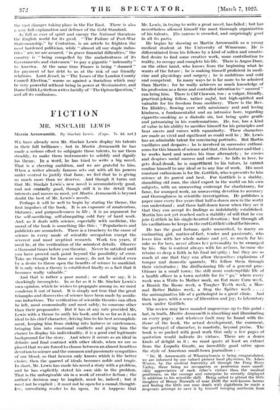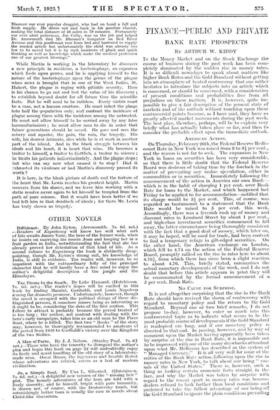FICTION
MR. SINCLAIR LEWIS
Martin Arrowsmith. By Sinclair Lewis. (Cape. is. ad. net.)
WE have already seen Mr. Sinclair Lewis display his talents in their full brilliance ; but in Martin Arrowsmith he has made a serious effort to subjugate those talents, to use them steadily, to make them instruments to solidify and dignify his theme. In a word, he has tried to write a big novel. That is a cheering ambition, and we are grateful to him. When a writer already famous sets out with all his powers under control to justify that fame, we feel that he is giving us much more than we deserve. And though it turns out that Mr. Sinclair Lewis's new novel is accumulatively good, and not centrally good, though still it is the detail that interests and moves us most, yet Martin Arrowsmith is beyond doubt the best of Mr. Lewis's novels.
Perhaps it will be well to begin by stating the theme, the first impulses of the book. It is an exposure of amateurism, blatancy, and purposelessness in life ; it is an argument for the self-sacrificing, self-abnegating cold fury of hard work. And, as it deals with science, especially with medicine, the moral of the book is something like this : "Popularizers and publicists arc scoundrels. There is a treachery to the cause of science in every mode of scientific occupation except the severest and most sceptical research. Work ten years, if need be, at the verification of the minutest details. Observe a thousand times before you theorize. Never be satisfied until you have proved each point beyond the possibility of error. Take no thought for fame or money, do not be misled even by a desire to throw open the benefits of science to mankind. It is only when a theory is established finally as a fact that it becomes really valuable."
And that is rather a poor moral ; or shall we say, it is shockingly incomplete. In so far as it is Mr. Sinclair Lewis's own opinion, which he wishes to propagate among us, we must condemn it out of hand. It is simply not true that the great triumphs and discoveries of science have been made by assidu- ous inductions. The verification of scientific theories can often be left, most economically and most safely, to someone other than their propounder. But it has at any rate provided Mr. Lewis with a theme to unify his book, and in so far as it is an ideAl to his chief character, driving him to his best accomplish- ment, keeping him from sinking into laziness or carelessness, bringing him into emotional conflicts and giving him the chance to display his individuality, it is a good and legitimate background for the story. And where it occurs as an ideal in definite and final contrast with other ideals, when we are so placed that we are forced to choose between an almost heartless devotion to science and the common' nd passionate sympathies of our blood, so that .heaven -only -knows which is the better choice, then the quarrel of ideals. becomes noble and tragic. In short, Mr. Lewis has made his novel a story with a problem, and he has explicitly stated his own side in the problem. That is the unforgivable sin in a work of creative fiction ; the author's decision may be implicit; must be, indeed ; but it must not be explicit ; it must not be open for a casual, thought-
unrealizing reader to fix upon. So it happens that Mr. Lewis, in trying to write a great novel, has failed ; but has
nevertheless allowed himself the most thorough organization of his talents, His canvas is crowded, and surprisingly good
in all its parts.
He begins by showing us Martin Arrowsmith as a young medical student at the University of Winnemac. He is differentiated from his fellows by a kind of sullen and unsatis- fied desire to find some creative work, some contribution to reality, to occupy and complete his life. There is Angus Muir, on the-other hand, who knows from the beginning what he wants of the future ; he is making himself proficient in medi- cine and physiology and surgery ; he is ambitious and cold and competent. In many ways he is far more to be admired than Martin ; for he really achieves as much knowledge of his profession as a fierce and controlled intention to " succeed " can bring him. There is Clif Clawson, too ; a vulgar, friendly, practical-joking fellow, rather awful, but high-spirited and valuable for his freedom from snobbery. There is the Rev. Ira Hinkley, flowing over with missionary zeal and loving kindness, a fundamentalist and an intrusive bore, regarding cigarette-smoking as a diabolic sin, but being quite gentle and patronizing in his condemnations. • He, too, has a kind of value in his ability to sacrifice himself for his principles and bear sneers and curses with equanimity. These characters are made as vivid and significant as could well be ; Mr. Lewis has an admirable talent for convincing portraits. But Martin
vacillates and despairs : he is involved in successive enthusi- asms for this branch of science and that, this lecturer and that ; he works hard and :wastes his time alternately ; he envies and despises social success and culture ; be falls in love, he gets dead-drunk, he is impertinent to his tutors, he cannot
confine himself to any ideal or to any line of work. - His most constant enthusiasm is for Dr. Gottlieb, who represents to him science at its purest and best. For Gottlieb is a shabby, shambling old man, the chief expert in the world on his own subjects, with an unwavering contempt for charlatanry, for fame, for stamped work, an unwavering devotion to accuracy and thoroughness in scientific investigation. He publishes a paper once every five years that half-a-dozen men in the world can understand ; and those half-dozen know when they see it that they can accept its findings as indubitably established.
Martin has not yet reached such a stability of will that he can join Gottlieb in his single-hearted devotion ; but through all his vacillations he keeps in the end Gottlieb's ideal for his own.
Ire has the good fortune, quite unmerited, to marry an enchanting girl, matter-of-fact, tender and passionate, who loves him with her whole nature and yet, as much for his sake as for hers, never allows her personality to be swamped. by his. She is content always with his actions, because she retains so deep a faith in his final integrity ; but they are so much at one that they can allow themselves explosions cf temper and domestic quarrels. We follow them through
their vicissitudes ; the disillusioning life of a general prac- titioner in a small town ; the still more contemptible life of a health officer in a town notable for its " go," where every week was a Write to Mother week, an Eat more Corn week, a Banish the Booze week, a Tougher Teeth week; a More and Better Babies week, a Stop the Spitter. Week . . . ; the unimaginative life of a pathologist in a great clinic. And then he goes, with a sense of liberation and joy, to laboratory work under Gottlieb.
The review may have sounded ungenerous up to this point ; but, in truth, Martin Arrowsmith is absorbing and illuminating on every page ; and whatever fault may be found with the theme of the book, the actual development, the comment, the portrayal of character, is masterly, beyond praise. :Ile book is so packed with good work that only .a few pageiof quotation would indicate its virtues. There arc a dozen
kinds of delight in it ; we must quote at least an extract from the Leopolis Gazette, an incredibly good satire upon the style of American small-town journalism :—
" Dr. M. Arrowsmith of Wheatsylvania is being congratulated, we are informed by our valued pioneer local physician, Dr. Adam Winter, by the medical fraternity all through -the Pong River Valley, there being no occupation or profession more unself- ishly appreciative Of each other's virtues than the medical gentlemen, on the courage and enterprise he recently displayed in addition to his scientific skill. Being called, to attend the little daughter of Henry Norwalk-of near Delft the well-known farmer and finding the little one near death with diphtheria he made a desperate attempt to save it by himself bringing antitoxin from -Messner our ever popular druggist, who had on hand a full and fresh supply. He drove out and ,back in his gasoline :chariot, making the total distance of 48.miles -in 79 minutes. Fortunately our ever alert policeman, Joe Colby, was on the job and helped Dr. Arrowsmith find Mr. Blassner's bungalow on Red River Avenue and this gentleman rose from bed-and hastened 'to supply the needed article but unfortunately the .child was .already too low to be saved but it is by such incidents of pluck and quick thinking as well as knowledge which make the medical profession one of our greatest blessings."
While Martin is working in the laboratbry he discovers a new principle in medicine, a bacteriophage, an organism which feeds upon -germs, -and lie is applying -himself to the nature of the bacteriophage :upon the germs of the plague when news is brought that in one of the West Indies, St. Hubert, the plague is raging with pitiable -severity. Here is his chance to ,go out and test the value of his discovery ; to establish beyond doubt for all future time the scientific facts. But he will need to be -ruthless. -Every victim must be a case, not :a human creature. I-Ie must infect the :phage into half the population only, and -contrast the incidence of plague among them with the incidence among the -untreated. He must not allow himself to be carried away by any false humanitarianism ; he must allow men to die in Order that future generations should be saved. He goes and sees the misery and squalor, the pain, the ruin, the tragedy. His wife, his dearest intimate, dies while he is at work in another part of the island. And in the black struggle between his ideals and -his heart, it is heart that wins. -He becomes a traitor to himself, a traitor to Gottlieb, a traitor to science ; he treats his patients indiscriminately. And the plague stops but who can say now what caused -it to :stop ? -Had it exhausted its virulence or had •Martin?.s -discovery proved its worth .?
It is here, in the bleak ,picture of death and the torture of the heart that Mr. Lewis reaches his greatest height. Martin recovers from his shame,-and we -leave him working with -a static resolve never again to let himself be -tempted from the path of pure science. •But it would have been -better if we bad left him -in that deadlock of ideals-; for there Mr. Lewis has truly shown us tragedy.



























































 Previous page
Previous page